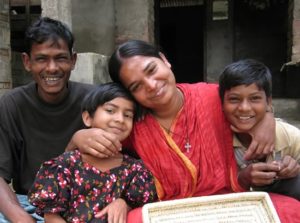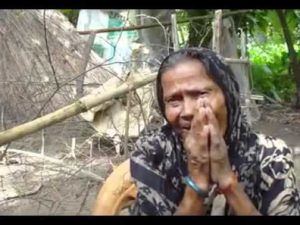Masuma Billah In our social structure, the family is considered as the basic institution, if the family is the nucleus of the society and if that nucleus is insecure, then there is room to think how safe the whole society is. If women are half of the total population and if this half of the population is insecure in their own homes, then we have to accept that the society is failing to provide security to half of the population.

Recently, we celebrated Mother's Day in imitation of the West. The commercial establishments were sitting with various gifts on this day. The schools of the city have been teaching the young children the glory of Mother's Day, the glory of the mother. Social media was full of great statuses. It is rare to find a man who does not love his mother or who does not have a heart for his mother. The feeling of losing a mother seems to be echoing in the hearts of all the people of the world. Who is the mother who loves so much? Either my mother or your mother or someone else's mother, to put it mildly, that mother was either your mother or the mother of your child. In these two identities, the glorious mother at home, but why so neglected, tortured?
In this year of celebrating Mother's Day or Women's Day, let us think about whether we have been able to ensure a safe home for mothers or women today? A mother who is at the top of our love ladder, brutal family violence comes down on her. Domestic abuse is no longer an isolated incident in our social fabric, but a social disease, a significant social agenda covered in the vast majority of daily newspapers. It is very important to mention here that Bangladesh Demographic Health Survey in its latest report (published 2009) for the first time included domestic violence in their nationwide survey questionnaire which in turn indicates the increasing prevalence of domestic violence in Bangladesh. The said report lists 8 types of torture based on danger and risk. In order of severity they are (1) striking, lashing or throwing something, (2) slapping, (3) twisting the skin and pulling the hair, (4) punching with the hand or something that can cause injury, or Injuring, (8) Forcing sexual intercourse by physical force. The first 7 tortures are identified as physical torture and the last as sexual torture.
According to data from the Bangladesh Demographic Health Survey, about half (49%) of married women are victims of some form of physical abuse by their husbands, 18% women are victims of sexual abuse by their husbands, and more than half (53%) of women are victims of some form of physical or sexual abuse by their husbands. Being victimized. The most common form of abuse was slapping and 461 TP3T women were slapped by their husbands and 151 TP3T women were kicked and beaten. Younger married women (15 to 24 years) are more likely to be victims of sexual assault at 1 in 5. The report also reveals that there is a relationship between family practices and family violence. Men who witnessed the abuse of a female partner by a father or other male authority figure in their family environment were subsequently more likely to have participated in domestic violence themselves.
A woman who is a mother, a woman who is compassionate, a woman who keeps her child whether it is a boy or a girl, a woman who works hard to build a happy home, this report clearly shows how dangerous that home is for women. . It is worth saying that this is not the true picture of domestic violence. Another study on domestic violence in Bangladesh found that only 11 TP3T of domestic violence comes to the public or discussed, while the remaining 991 TP3T remain behind the scenes. Needless to say, it is only possible to portray a fraction of the real picture of domestic abuse due to respect and social shame (Pashatdhash grashabhapava), and if this fractional picture is so horrific, then the picture of a decaying society as a whole is undoubtedly depressing.
The worst aspect of domestic violence is that it is directly related to the personal safety of the person and the abuser is close to the victim or in other words the abuser is the person who is supposed to be socially, legally and psychologically responsible for ensuring maximum safety of the woman. In almost all cases the abused women are forced to live with the abuser due to social pressure. The home, which is the first refuge of safety, is only stepped in by society or state institutions to protect it when torture consumes the individual or when the tortured himself becomes helpless and complains (which rarely happens in our society).
In our social structure, the family is considered as the basic institution, if the family is the nucleus of the society and if that nucleus is insecure, then there is room to think how safe the whole society is. If women are half of the total population and if this half of the population is insecure in their own homes, then it has to be accepted that the society is failing to provide security to half of the population. This is about direct insecurity, now let's talk about those who are indirectly affected or become insecure due to domestic violence. It goes without saying that the children of the family are the most affected by family violence, in which the children suffer from insecurity and their normal development is blocked and subsequently these children are at a higher risk of being involved in family violence. So according to the data obtained from the research, if half of the women in the society are victims of some kind of domestic violence, then are we not creating barriers in the way of the development of half of the members of our next generation? The child who is yours, who is your legacy, whose full development can change the meaning of your life, who can open the doors of possibilities for you, who is the greatest capital for the family, society or the state, we will stop his development by our own behavior. Forgetting or temporary anger due to not being able to control anger! Let's think a little deeper.

I agree that the women of the current century have progressed but not less. Women today are astronauts, heads of states, chief executives or researchers. Women are now beyond school and into university. Today the woman decides for herself where she will involve herself, in running the family, or in earning - or both. But if women cannot be given security at home, then all the development of women will be silently stalled. To save the family, the family structure that surrounds women, let's work from each position to avoid domestic violence against women.
Women are people, just like men are people. Women's rights are human rights. Let us be humane, men and women together to build a humane society. Flexibility in woman's behavior, woman's infinite capacity to love, woman's kindness to forgive easily, woman's ability to handle the situation with patience, woman's ability to embrace others with great care, woman's desire to soak her child in the juice of life little by little with intense love - none of these These are not women's weaknesses but their surplus achievements as women, the evolved aspects of the female personality. If the family is the nucleus of the society, the nucleus of the family is the woman. Avoiding all hypocrisy and hypocrisy, let us resist family violence from our position. And if you don't remember one thing, you will suffer the most, and that is - the biggest victim of family violence is your child, your self. Domestic abuse will inevitably disrupt your child's emotional development. (The women of our country are always neglected. There are still many women who are victims of neglect in the villages. Considering all these women, this article of Masuma Billah published in Dainik Yugantar is presented to the readers)
Masuma Billah: Researcher, working in private development organization
b-masuma@hotmail.com


